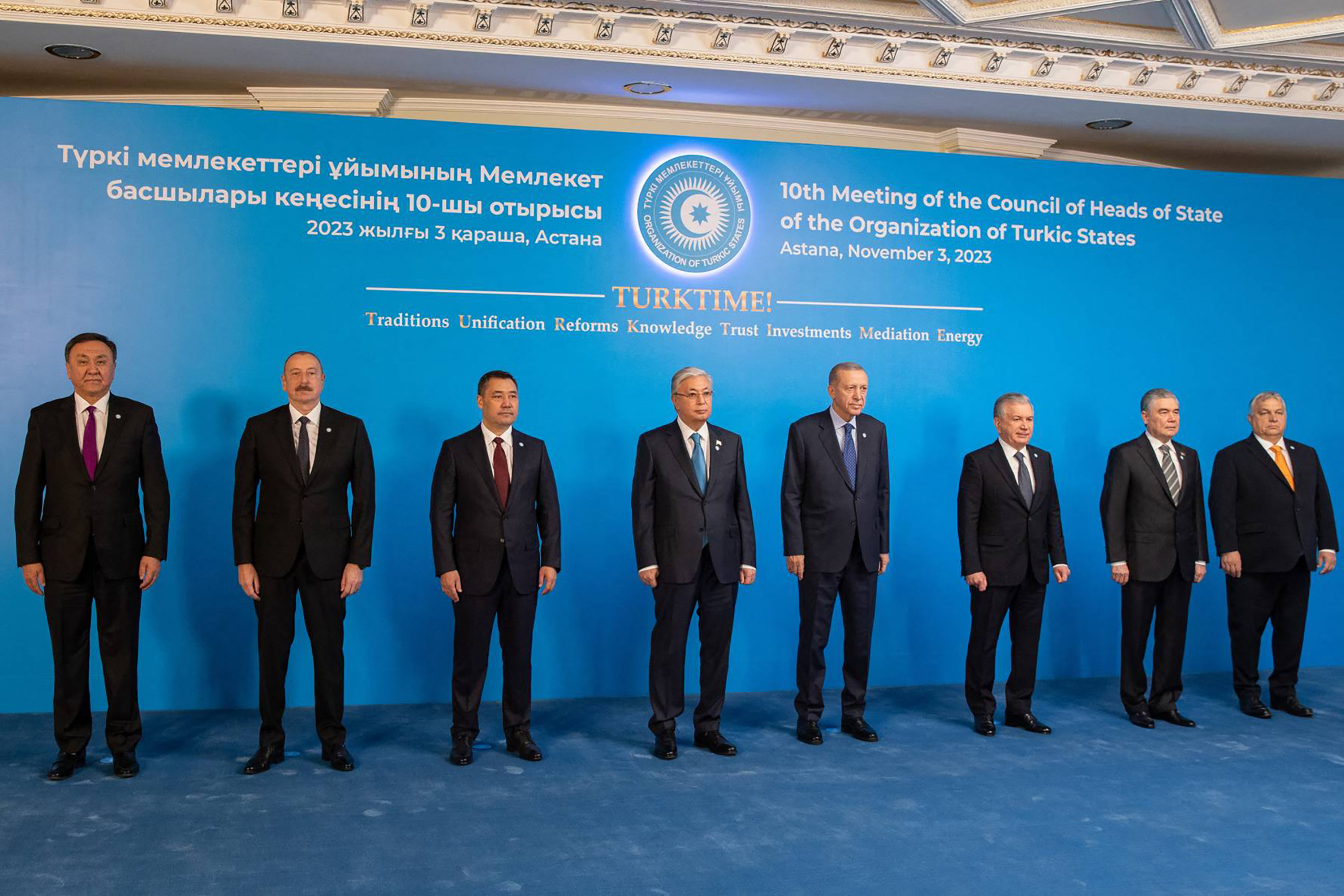While the world remains focused on de-escalating the Israel-Hamas war and the ongoing conflict in Ukraine, Turkey’s attention is increasingly on gaining a foothold in former Soviet republics of the South Caucasus and Central Asia.
Shared culture provides the rationale for closer ties. Trade and security deals, negotiated with the Organization of Turkic States (OTS), offer the motivation.
At last week’s OTS summit, in the Kazakh capital of Astana, Turkish President Recep Tayyip Erdogan said that it’s the Turkic language that bonds Turkey with Azerbaijan, Kazakhstan, Kyrgyzstan, Turkmenistan, and Uzbekistan. Echoing calls for a common Turkic alphabet, the Turkish leader said language enabled the countries’ unity.
Although largely symbolic, the plea was a message to Kazakhstan and Uzbekistan to abandon Cyrillic, which forms the basis of the Russian script, in favor of the Latin alphabet, which was adopted by Turkey in 1928. Ankara’s ally Azerbaijan made the transition in 2001, a move viewed clearly as a repudiation of former Soviet rule. Turkmenistan, an OTS observer, switched to Latin script even earlier, in the 1990s.
Of course for Turkey, the organization is more than a bloc for creating a common script. Rather, it’s an emerging instrument that could help Turkey crowd Russia out of the South Caucasus and Central Asia, strategically important regions where Turkic-speaking people make up most of the population.
The big question is whether other members share Turkey’s ambition. Evidence to date suggests they may not.
For instance, one of Turkey’s goals is to convince OTS nations to support the Turkish Republic of Northern Cyprus (TRNC). Recognized only by Turkey, TRNC is considered by the international community to be part of the Republic of Cyprus. Like Turkmenistan, TRNC is an observer state to OTS.
The Organization of Turkic States members, meanwhile, appear split on their stance toward TRNC. Unlike at the previous OTS summit in Ankara in March, where the Turkish-Cypriot leader Ersin Tatar was treated like a head of state, in Astana last week, there was no official TRNC presence.
Other geopolitical matters are even more divisive.
Despite being allies, Turkey and Azerbaijan have diametrically opposed attitudes on the Israel-Gaza conflict. While Azerbaijan’s people openly support Israel – and Baku supplies Israel with 60 percent of its oil needs – Erdogan spews anti-Israel rhetoric.
Trade corridors are another point of contention. Azerbaijan, Kazakhstan, and Turkey share an interest in a quick realization of the Middle Corridor project, a transportation route starting from Southeast Asia and China, running through Kazakhstan, the Caspian Sea, Azerbaijan, Georgia, Turkey, and on to Europe.
Kyrgyzstan and Uzbekistan, meanwhile, have supported Russia’s plans to build the Southern Transport Corridor, which would effectively bypass Kazakhstan.
What most, if not all, former Soviet Turkic-speaking countries have in common is a desire to leave Russia’s zone of influence.
Kazakhstan is looking to develop closer ties with neighboring Turkic states and the West, giving Turkey an opening for engagement. Kyrgyzstan is also in play. Despite being Russia’s ally in the Collective Security Treaty Organization (CSTO), it has recently purchased Turkish-made Akinci and Aksungur drones, which are used for border security.
Kyrgyzstan already has Turkish-made Bayraktar unmanned aerial vehicles; it reportedly used them against Tajikistan during a 2022 border clash.
Beyond military hardware, Turkey is also using economic cooperation to entice engagement with the former Soviet Central Asian republics. For instance, Ankara aims to reach a $10-billion bilateral trade target with Kazakhstan, while Turkish companies’ investments in Uzbekistan have already reached $1.5 billion.
But the problem for Ankara is that OTS members are land-locked countries heavily dependent on Russian geography. For instance, Turkmenistan and Kazakhstan, as major energy exporters, rely on oil and gas pipelines traversing Russian territory to reach their customers in Europe. As long as Russia remains an important transit country for the Turkic world’s energy resources, Turkey’s bid to supplant Russia in the region will be a tall order.
The fact is that OTS members from the post-Soviet space need Russia as much as they aspire to increase ties with Turkey. Each remains integrated into the Russian-dominated Commonwealth of Independent States, and Kazakhstan and Kyrgyzstan remain part of the Moscow-led Eurasian Economic Union, as well as the CSTO.
These alignments suggest that for most Turkic states, Turkey’s vision of an Ankara-led Turkic world order is overly myopic. Erdogan might see it in simple terms of letters on a piece of paper, but for Turkey’s brethren in former Soviet republics, the final chapter with Moscow has yet to be written.
Nikola Mikovic is a political analyst in Serbia. His work focuses mostly on the foreign policies of Russia, Belarus, and Ukraine, with special attention on energy and pipeline politics. X: @nikola_mikovic

